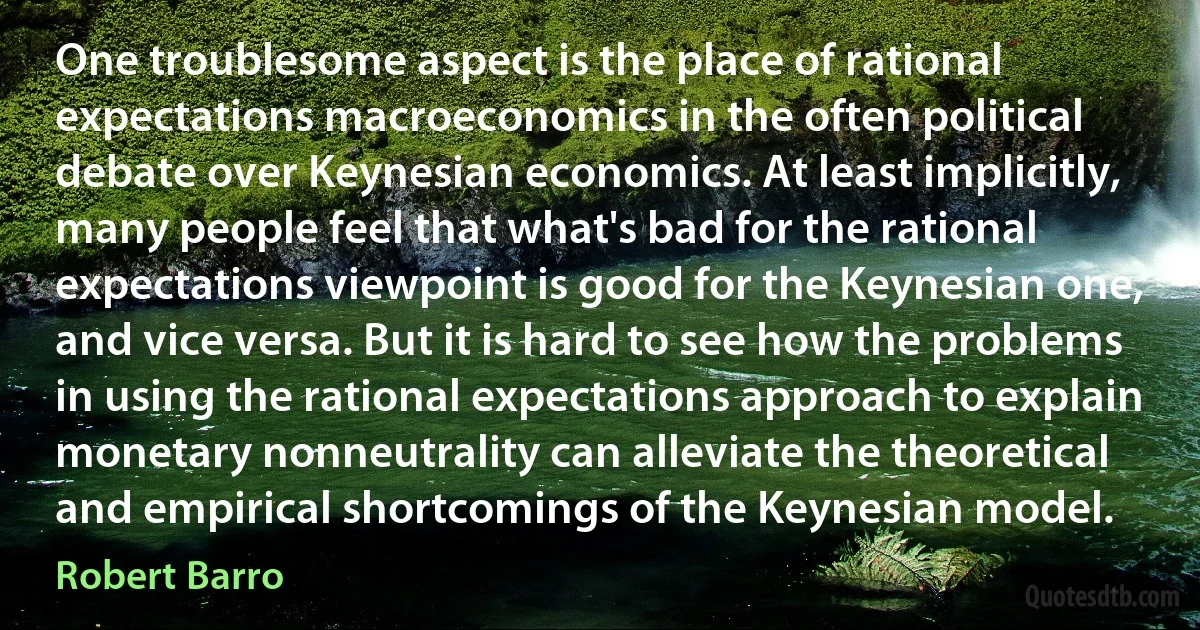Keynesian Quotes - page 2
Keynesian economics is the economics of nominal rigidities basically, nominal rigidities everywhere. Fully anticipated money does affect output. Everybody can see that! So, it's right. The fact that it's not as theoretically tidy as Lucas's 1972 Journal of Economic Theory paper is not a reason to throw it away. That's become a minority view in this profession, unfortunately. It wouldn't have been in the '60s.

Alan Blinder
Monetarism-both of the older Friedman version stressing adherence to money stock targets and of the newer rational expectations variety-has been badly discredited. The stage has been set for recovery in the popularity of Keynesian diagnoses and remedies. I do not mean to imply, of course, that there is some Keynesian truth, vintage 1936 or 1961, to which economists and policymakers will or should now return, ignoring the lessons of economic events and of developments in economics itself over these last turbulent fifteen years. I do mean that in the new intellectual synthesis which I hope and expect will emerge to replace the divisive controversies and chaotic debates on macroeconomic policies, Keynesian ideas will have a prominent place.

James Tobin
For a period of roughly 35 years, Keynesian theory provided a central paradigm for macroeconomists, and considerable progress was made on several empirical fronts. It was widely recognized that some of the ingredients of Keynesian economics (e.g. money illusion and/or nominal wage rigidity) rested on slender to non-existent microtheoretic foundations; and there were always dissenters. But, thought of as a collection of empirical regularities that fit together into a coherent whole, the theory worked tolerably well. In the 1970s, however, the Keynesian paradigm was rejected by a great many academic economists, especially in the United States, in favour of what we now call new classical economics. By about 1980, it was hard to find an American academic macroeconomist under the age of 40 who professed to be a Keynesian. That was an astonishing intellectual turnabout in less than a decade, an intellectual revolution for sure.

Alan Blinder
The trend of employment is towards a high level, and a recurrence of chronic mass unemployment is most unlikely. The Keynesian techniques are now well understood, and there is no reason to fear a repetition of the New Deal experience of a government with the will to spend its way out of a recession, but frustrated in doing so by faulty knowledge. The political pressure for full employment is stronger than ever before; the experience of the inter-war years bit so deeply into the political psychology of the nation that full employment, if threatened, would always constitute the dominant issue at any election, and no right-wing party could now survive a year in office if it permitted the figures of unemployment which were previously quite normal.

Anthony Crosland
Some people, myself included, advocated foreign intervention in Bosnia and Kosovo while opposing our adventure in Iraq. Sam Moyn might find this inconsistent, but (on this occasion at least) it is the world that is inconsistent, not us. During the Balkan wars individuals' rights were under ascertainable threat in real time. Outside intervention could make a difference, and it did. This was not the case in Iraq. We should always be suspicious of the invocation of universal "rights” as a cover for sectional interests. But it doesn't follow from this that talk of rights is "really” always about something else. Sometimes it is, and sometimes it isn't. How, then, should we adjust our response? Well, there is a serviceable Keynesian answer to that: "When the facts change, I change my mind. What do you do?”.

Tony Judt
I find it amazing now that my first economics class, taught by Alan Sweezy, used John Maynard Keynes's General Theory of Income and Employment as the textbook. Although this book is one of the most influential works of the twentieth century, it makes a really lousy textbook. Moreover, since I now regard Keynes's analysis as seriously flawed, it is surprising that I enjoyed the course so much. As a student, I appreciated the simple way that the Keynesian model explained the workings and failings of the overall economy. Especially appealing were the clever policy remedies, such as increased government spending and tax cuts, that Keynes recommended to combat unemployment. Too bad that I discovered later that the model was theoretically and empirically deficient!

Robert Barro
These ideas have implications not only for theoretical and econometric practices but also for the ways in which policymakers and their advisers think about the choices confronting them. In particular, the rational expectations approach directs attention away from particular isolated actions and toward choices among feasible rules of the game, or repeated strategies for choosing policy variables. While Keynesian and monetarists macroeconomic models have been used to try to analyze what the effects of isolated actions would be, it is now clear that the answers they have given have necessarily been bad, if only because such questions are ill-posed.

Thomas J. Sargent
What theory can we use to get us out of the impending slump quickly and reliably? To use the 'new classical' theory of fluctuations begun at Chicago in the 1970s – the theory in which the "risk management" models are embedded – is unthinkable, since it is precisely the theory falsified by the asset price collapse. The thoughts of some have turned to John Maynard Keynes. His insights into uncertainty and speculation were deep. Yet his employment theory was problematic and the 'Keynesian' policy solutions are questionable at best.... At the end of his life Keynes wrote of 'modernist stuff, gone wrong and turned sour and silly'. He told his friend Friedrich Hayek he intended to re-examine his theory in his next book. He would have moved on. The admiration we all have for Keynes's fabulous contributions should not sway us from moving on.

Edmund Phelps
Accounting for the artificial boom and the consequent bust is not part of Keynesian income-expenditure analysis, nor is it an integral part of monetarist analysis. The absence of any significant relationship between boom and bust is an inevitable result of dealing with the investment sector in aggregate terms. The analytical oversight derives from theoretical formulation in Keynesian analysis and from empirical observation in monetarist analysis. But from an Austrian perspective, the differences in method and substance are outweighed by the common implication of Keynesianism and monetarism, namely, that there is no boom-bust cycle of any macroeconomic significance.

Roger Garrison
Skidelsky tells us, Keynes was also practical, absorbed in questions of economic policy, argumentative, benevolent and intolerant, often rude, and had an intellectual arrogance that would allow positions previously held with great passion to be calmly abandoned. Well, that is exactly what the Cambridge faculty was like in the 1960s. Not only did the ghost of Keynes dominate the content of economics education at Cambridge, it also dominated the style. That style could be sustained with substance only by the extraordinarily gifted. So it is not surprising that the Cambridge faculty, although still very "Keynesian," looks much more conventional these days.

John Eatwell, Baron Eatwell



